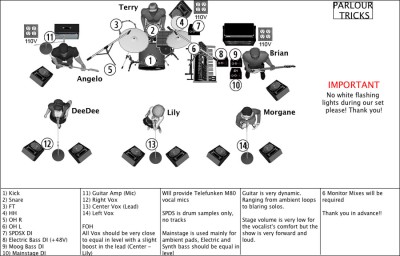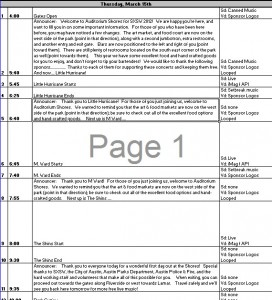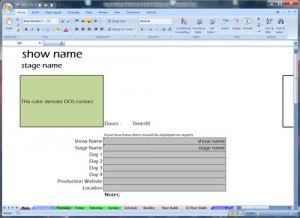Stage Manager Guide
The Stage Manager is one of the most important jobs at events and festivals. The SM is in charge of ensuring all related parties in a stage production – be it theater or concert – are communicating effectively, on the same page, and able to work together to pull off the performance flawlessly.
Looking to become a stage manager or wish to learn more about stage management? Below we have split up the two main types of stage managers and dive into the details for each.
Theater / Convention Stage Managers
- Primary Roles for a Theater Stage Manager:
- Backstage lighting set up
- Green room set up and management
- Keep shows running on time
- Creating and posting day of show schedule
- Scheduling load in and load out times
- Planning and informing all crew of change over procedures
- Managing backstage security
- Addressing immediate medical concerns
- Escorting artists to and from the performance area
- Ensuring stage is clean and swept before artist arrival
- Calling cues / following the script
- Managing riser use and placement
- Essential items for a theater stage manager
- View our “What’s in Your Bag” article
- Clear-Com type communication device for interaction with the Technical Director and calling cues
- Visit this link for the theater Stage Manager’s Checklist
- Essential items for a convention stage manager
- View our “What’s in Your Bag” article
- Clear-Com type communication device for interaction with the Technical Director and calling cues
- Countdown clock for speech timing
- Teleprompters if needed
- Essential reading
- Use of teleprompters
- For events with speeches, often there will be a teleprompter service set up. Prior advancing of the script and run of show Clear-Com communication with the teleprompter operator is essential in order to keep everything on time.
- Use of timers
- Some events will also have countdown timer software that can be reset at the click of a button every time there is a new cue / speech / script change. Usually a Stage Manager will have an assistant handle this.
- Working with stage cues
- Stage cues are simply a predefined number of actions occurring on the stage; every time there is a new cue, there’s a new call to action, including:
- The start of a video
- A VOG talking to the crowd to tell them to take their seats
- The start of a speech
- The end of a speech with a brief set change
- The start of a band
- Stage Managers are normally responsible for ensuring that all cues are executed on time within the predetermined script parameters – but for larger events, this responsibility may fall to a Technical Director, who will coordinate with the Stage Manager, Video Team, Sound Team, Lighting Team, Teleprompter, and Countdown Clock assistant to ensure a smoothly running show.
- Stage cues are simply a predefined number of actions occurring on the stage; every time there is a new cue, there’s a new call to action, including:
Special Feature: Jason Tremblay’s Online Theater Production & Stage Management Lectures
- This is a six part YouTube video series that goes in to detail on how to properly production and stage manage in a theater setting.
- Topics discussed include:
Concert / Festival Stage Managers
- Essential items
- View our “What’s in Your Bag” article
- Essential reading
- View our Production Guide
- Stage Manager Checklist
- General Stage Manager 101
- Your primary role
- The Stage Manager is the chief liaison between the artists, production vendors, the venue, and /or the festival promoter. Your job is to make sure the artists arrive on time, load-in, sound/line check, play the proper amount of time, load out, and go on their way. And while they’re on-site your job to ensure all of their needs are met (for larger events, there can be an Hospitality Manager or Artist Relations Manager that takes over the non-production needs of the artists away from the Stage Manager so they can focus just on production).
- Information you’ll want to get from bands
- Stage plot / input list – below is an example from the band Parlour Tricks

Note it clearly shows where each band member, instrument, microphone, and monitor wedge are supposed to be placed on the stage. It also has a list of inputs for the FOH engineer to base his mix from. - # in band / crew that day
- # of vehicles coming / what type
- Are they sharing backline?
- Do they need / want an intro?
- Do they have any merch to sell?
- Stage plot / input list – below is an example from the band Parlour Tricks
- Information you’ll want to get from the venue / festival promoter:
- What all is the venue providing in terms of:
- Production
- Audio
- Lighting
- Stage
- Backline
- Video
- Offices / Internet
- Labor (Stagehands)
- Hospitality
- Green rooms / dressing rooms
- Lounge
- Meals / Catering
- Ground Transpo
- Hotels
- Rider requests
- Media / Merch
- Any meet and greets?
- Any interviews?
- Photo policy?
- Merch policy? Who sells? Split? Where do they set up?
- Production
- What all is the venue providing in terms of:
- General Band Needs:
- Needs of smaller bands
- Often, they may not have a stage plot or input list and will look to you for guidance
- Rarely will they have a formal rider with any specific technical or hospitality requests, so the best way to advance is to let them know what production and hospitality you will have for them and see if there are any concerns.
- They will likely want to bring their own gear, but sharing backline may make more sense if it’s a festival style situation with quick set changes and multiple bands per day.
- Needs of medium sized bands
- They usually have stage plots, input lists, and a couple of touring crew with them
- They will usually have light hospitality needs based on their rider, and some may have some specialized technical needs.
- They may need some coordination with labor depending on how much gear they’re bringing in (some will bring in their own lighting package, consoles, or risers, for example).
- Needs of nationally touring bands
- They will have a formal technical and hospitality rider and will likely request items such as rigging plots, site maps, backstage accommodations (dressing rooms, production offices, etc), security details, and sponsorship tie-ins
- They will be usually very turnkey and only turn to you for venue related issues / questions. But that doesn’t mean you have less work to do – it’s very important they don’t run into any hiccups because, for example, there’s suddenly no power and the electrician is nowhere to be found. Knowing where your key vendors / players are and keeping track of load-in / run of show / load-out is vital to ensuring a successful performance.
- Needs of smaller bands
- Basic Run of Show List:
- Mojo gaffed
- Signage up
- Trash bins
- Coolers / ice / drinks
- Show sheets posted
- Stage plot / input list binders given to FOH/MW
- Meals for labor / staff
- Creds for labor / staff
- Packets for artists
- Video /photo production advance
- Security advance
- Collect signage / scrims after event
- Clean up backstage area, coordinate with local site crew or vendors to pick up all infrastructure
- Run of Show Script – download .xls version here

- Your primary role
- Download the Uber Advance Workbook xls version
- – an .xls document with everything a stage manager needs to organize his contacts, create day of show schedules, and more. Screenshot below; courtesy of LFJ Partners

- – an .xls document with everything a stage manager needs to organize his contacts, create day of show schedules, and more. Screenshot below; courtesy of LFJ Partners
